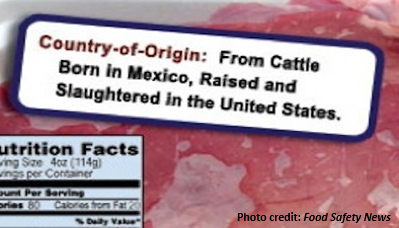- Like
- Digg
- Tumblr
- VKontakte
- Buffer
- Love This
- Odnoklassniki
- Meneame
- Blogger
- Amazon
- Yahoo Mail
- Gmail
- AOL
- Newsvine
- HackerNews
- Evernote
- MySpace
- Mail.ru
- Viadeo
- Line
- Comments
- SMS
- Viber
- Telegram
- Subscribe
- Facebook Messenger
- Kakao
- LiveJournal
- Yammer
- Edgar
- Fintel
- Mix
- Instapaper
- Copy Link
Most people want to know where their food comes from – and believe that fundamentally, they have the right to know. However, the US meat industry disagrees and is fighting to keep consumers in the dark as long as possible. In 2002, Congress passed a Country of Origin Labels law, commonly referred to as “COOL.” This law requires that on packages of fresh meat products, meat producers must identify the country where the animals were born, raised, and slaughtered. But the meat industry thinks COOL is, well, uncool – so it is fighting the law tooth and nail. Why?
Meat producers claim this truth in labeling law poses significant burdens on their industry. It’s not uncommon for slaughterhouses to kill thousands of animals from around the globe all at once. To track and sort large numbers of animals moving across borders and to create various packaging labels to meet these legal requirements (example: born in Canada, raised in USA), the USDA estimates this could cost Tyson, Cargill, and other major meat processors upwards of $192 million.
However, there’s another reason meat producers may oppose COOL. According to Food Safety News, the meat industry knows that US consumers are likely to shy away from buying foreign meat, and the new COOL rules require much more specificity than in the past. This poses a huge problem for meat producers, since 2.22 billion pounds of beef alone are imported each year.
So the meat industry is fighting back. Producers challenged the requirements in court, claiming that the mandatory labeling violated their right to free speech. However, the D.C. Circuit Court of Appeals has rejected this claim (twice!), finding that the labels were vital for consumers’ information and health. The World Trade Organization agrees, ruling recently that the labels give consumers important information regarding the origins of their meat products.
Following these rulings, Senator Debbie Stabenow, Chair of the Senate Committee on Agriculture, Nutrition and Forestry recognized the importance of these labels, stating “the World Trade Organization has once again ruled that consumers have a right to know where their food comes from.” Such a labeling scheme is vital for consumers because it sets a precedent for mandatory labels regarding other aspects of meat production – such as labels describing how animals are raised and treated by meat producers. Without these labeling laws, factory farms would much rather keep consumers in the dark about what they do to these animals.

